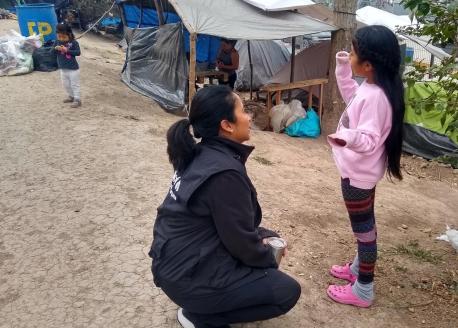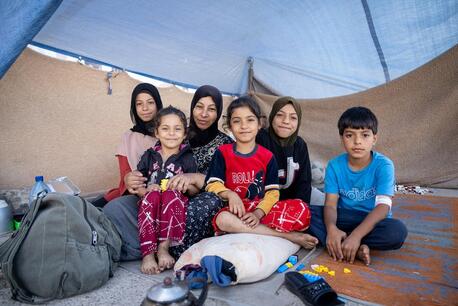
Children Seeking Asylum Deserve Protection
The U.S. must stop using COVID-19 as a pretext for deporting migrant children who have tested negative and thus pose no public health threat. All children have the right to grow up in safety.
Since mid-March, citing public health concerns, the United States has expelled more than 8,700 unaccompanied, vulnerable migrant children who were seeking protection in the U.S. — often sending them back to the violent situations from which they had to flee.
UNICEF USA believes that the United States can and must protect migrant children, even while responding to the pandemic. In fact, the U.S. government is already testing many children who arrive at its borders for COVID-19, but is then proceeding to remove them from the country if they do not have the virus rather than allowing them to move forward with their claim for asylum.
The U.S. government can and must protect migrant children
In July of this year, the U.S. government proposed a harmful rule that would give the Department of Homeland Security (DHS) the discretion to continue to bar almost anyone from seeking asylum in the U.S., claliming they present a “threat of introduction or further spread of international pandemics.”
If implemented, this rule would allow the U.S. to turn away almost any vulnerable child or family seeking international protection at the U.S. border beyond the measures already in place. Implementation of this rule would be unacceptable. In FY2019, 65 percent of apprehensions at the US-Mexico border included a child — some unaccompanied and others with family.
The data make it clear: asylum access is a children’s rights issue.
It is never in a child's best interests to be sent back to an unsafe situation
Within U.S. Code, Section 265 of Title 42 sets the legal framework for this protection ban, as it allows the Centers for Disease Control and Prevention (CDC) to “prohibit, in whole or in part, the introduction of persons and property” that might bring a disease into the United States.
Though the United States has publicly claimed that shutting down protection measures for unaccompanied children at its borders is important to “limit the further spread of coronavirus,” a court report filed by the U.S. government in July indicated that the United States is testing asylum-seeking children for COVID-19 and then expelling those who test negative, thereby deporting children who pose no threat to public health.
This testing infrastructure is an indication that the U.S. does have the capacity to do exactly as UNICEF is calling on governments around the world to do, which is implement public health measures to protect migrant children while responding to the pandemic. Rather than expel children after testing them for the virus, the U.S. should instead process them for asylum — utilizing the already existing standards which place children in family- or community-based care for the duration of their asylum proceedings.
As policies continue to limit children’s access to international protection in the United States, we need your help to halt them! Please join UNICEF USA in demanding that the United States government protect public health while protecting the rights and needs of children seeking asylum.
Top photo: UNICEF Mexico Deputy Representative Pressia Arifin-Cabo kneels down to chat with a child at an encampment in Matamoros in the northeastern state of Tamaulipas. © UNICEF/UNI285132/Vergara Toache
HOW TO HELP
There are many ways to make a difference
War, famine, poverty, natural disasters — threats to the world's children keep coming. But UNICEF won't stop working to keep children healthy and safe.
UNICEF works in over 190 countries and territories — more places than any other children's organization. UNICEF has the world's largest humanitarian warehouse and, when disaster strikes, can get supplies almost anywhere within 72 hours. Constantly innovating, always advocating for a better world for children, UNICEF works to ensure that every child can grow up healthy, educated, protected and respected.
Would you like to help give all children the opportunity to reach their full potential? There are many ways to get involved.





